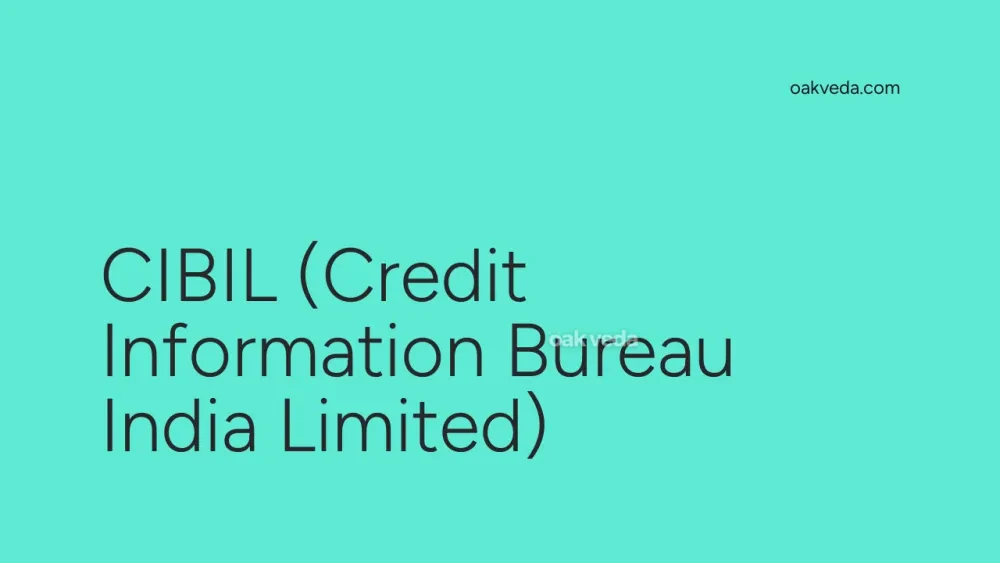
What is the Full Form of CIBIL?
CIBIL is the abbreviated form of Credit Information Bureau (India) Limited. This organization plays a crucial role in India's financial ecosystem by collecting, maintaining, and providing credit information of individuals and businesses.
What is Credit Information Bureau (India) Limited?
Credit Information Bureau (India) Limited, commonly known as CIBIL, is India's first and leading credit information company. Established in August 2000, CIBIL operates under the regulatory framework of the Reserve Bank of India (RBI) and is governed by the Credit Information Companies Regulation Act of 2005.
Origin and Development of CIBIL
CIBIL was founded to address the growing need for a centralized credit information system in India. As the country's economy expanded and credit became more accessible, financial institutions required a reliable method to assess creditworthiness. CIBIL filled this gap by creating a comprehensive database of credit histories and developing a standardized credit scoring system.
How does CIBIL work?
CIBIL operates by collecting and aggregating credit-related data from various financial institutions, including banks and non-banking financial companies (NBFCs). This information typically includes:
- Loan applications and approvals
- Credit card usage and payments
- Outstanding loan balances
- Repayment histories
CIBIL processes this data to generate credit reports and credit scores for individuals and businesses. These reports and scores are then made available to financial institutions to help them make informed lending decisions.
Functions of CIBIL
The primary functions of CIBIL include:
- Data Collection: Gathering credit-related information from various financial institutions.
- Credit Reporting: Compiling and maintaining comprehensive credit reports for individuals and businesses.
- Credit Scoring: Calculating credit scores based on credit histories and financial behaviors.
- Information Dissemination: Providing credit reports and scores to authorized financial institutions.
- Dispute Resolution: Addressing and resolving discrepancies in credit reports.
Applications of CIBIL
CIBIL's services find applications in various aspects of the financial sector:
- Loan Approvals: Banks and NBFCs use CIBIL scores to assess loan applicants' creditworthiness.
- Credit Card Issuance: Credit card companies rely on CIBIL reports for evaluating applications.
- Risk Assessment: Financial institutions use CIBIL data to gauge potential risks associated with lending.
- Financial Inclusion: CIBIL reports help extend credit to individuals with limited credit history.
Features of CIBIL
Key features of CIBIL include:
- Comprehensive Database: CIBIL maintains an extensive repository of credit information.
- Standardized Credit Scoring: The CIBIL score, ranging from 300 to 900, provides a quick assessment of creditworthiness.
- Regular Updates: Credit information is updated monthly to ensure accuracy.
- Secure Data Handling: CIBIL adheres to strict data protection and privacy norms.
- Consumer Access: Individuals can obtain their own credit reports and scores directly from CIBIL.
Benefits of CIBIL
CIBIL offers several benefits to both consumers and financial institutions:
For Consumers:
- Easier access to credit for those with good scores
- Motivation to maintain a healthy credit history
- Opportunity to negotiate better loan terms
- Protection against identity theft through regular monitoring
For Financial Institutions:
- Reduced risk of bad loans
- Faster loan processing and approval
- More informed lending decisions
- Improved portfolio management
Limitations or Challenges of CIBIL
Despite its importance, CIBIL faces certain challenges:
- Data Accuracy: Ensuring the accuracy of vast amounts of data can be challenging.
- Limited Coverage: Not all financial transactions are reported to CIBIL, potentially leading to incomplete profiles.
- Lack of Awareness: Many consumers are unaware of the importance of their CIBIL score.
- Dispute Resolution Time: Resolving errors in credit reports can sometimes be time-consuming.
Future Developments in CIBIL Technology
As technology evolves, CIBIL is likely to see advancements in:
- AI and Machine Learning: Enhancing credit scoring models for more accurate predictions.
- Real-time Reporting: Moving towards instantaneous updates of credit information.
- Alternative Data Sources: Incorporating non-traditional data to create more comprehensive credit profiles.
- Blockchain Integration: Improving data security and transparency in credit reporting.
FAQs on CIBIL Full Form
-
What is a good CIBIL score? A CIBIL score of 750 or above is generally considered good and increases the chances of loan approval.
-
How often is the CIBIL score updated? CIBIL scores are typically updated monthly as financial institutions report new data.
-
Can I improve my CIBIL score? Yes, you can improve your CIBIL score by paying bills on time, maintaining a low credit utilization ratio, and avoiding multiple loan applications in a short period.
-
Is CIBIL the only credit information company in India? No, while CIBIL is the oldest and most well-known, there are other credit information companies like Experian, Equifax, and CRIF High Mark.
-
How can I check my CIBIL score? You can check your CIBIL score by visiting the official CIBIL website and requesting your credit report, which is available for free once a year.
In conclusion, Credit Information Bureau (India) Limited, or CIBIL, plays a vital role in India's financial landscape. By providing comprehensive credit information, CIBIL enables more informed lending decisions, promotes financial discipline among borrowers, and contributes to the overall health of the credit ecosystem in India.
You may be interested in:

